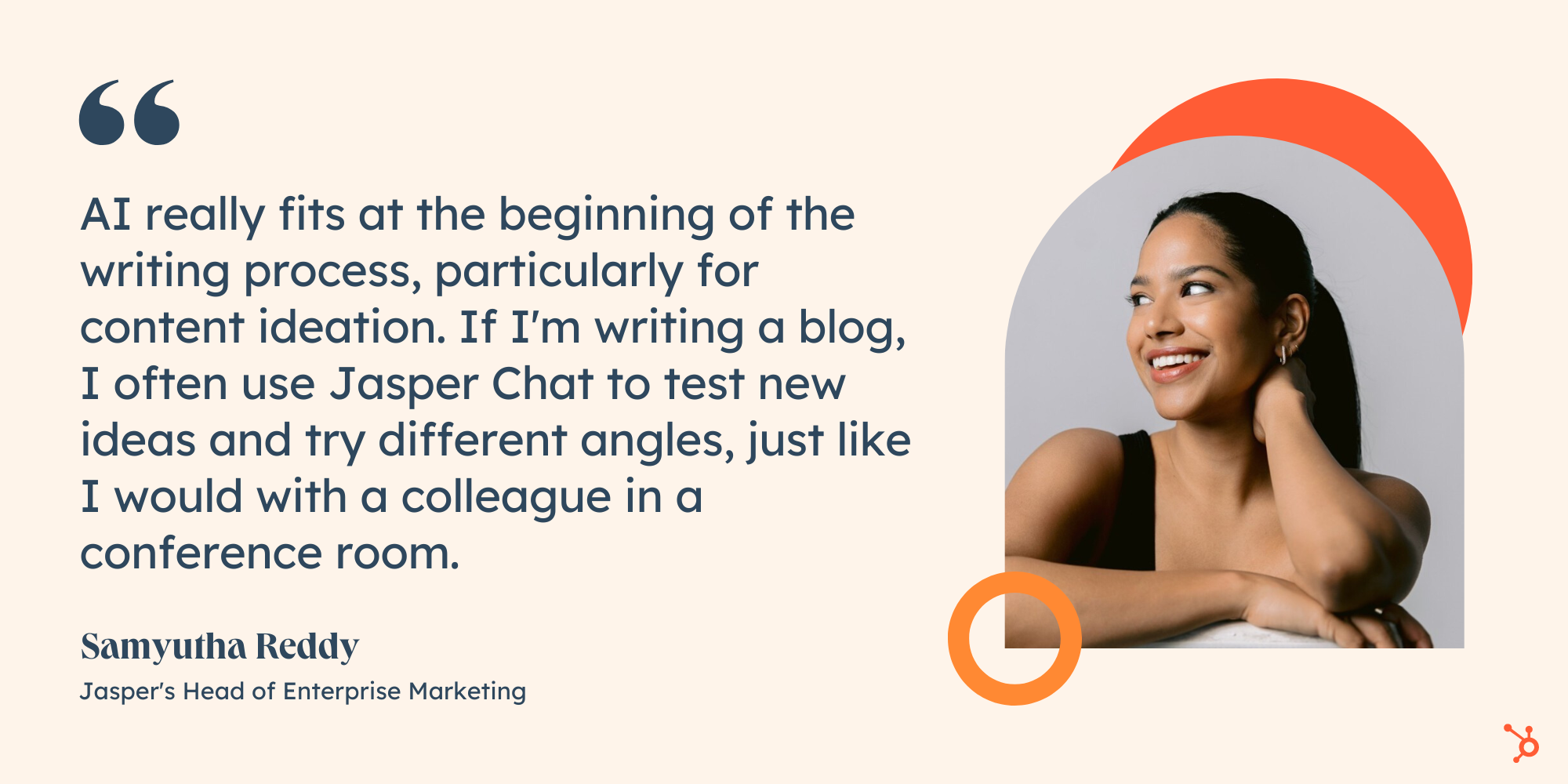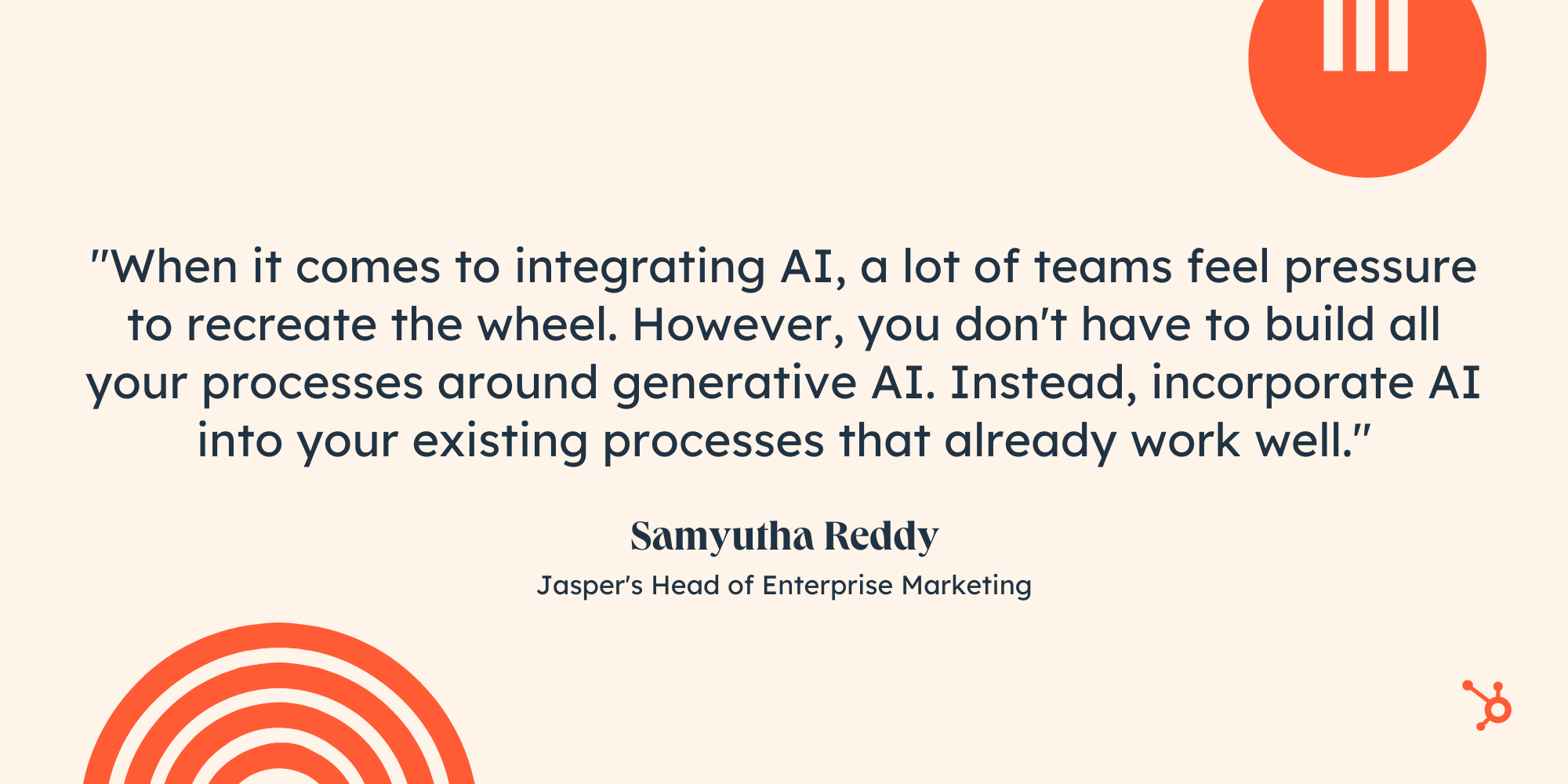In a new commercial for Mint Mobile, co-founder Ryan Reynolds reads from a script written entirely by ChatGPT.
His prompt was simple enough: include a joke, a curse word, and let people know about the company’s holiday promotion – all in the voice of Ryan Reynolds.
The results, in his own words, were “compelling” but also “mildly terrifying.”
Admittedly, the Mint Mobile ad is a little stunty. However, it’s a prime example of marketers using AI to streamline the creative process.
That said, AI is still in its early stages, and marketers need to know how to use these tools correctly. Here, I spoke with Samyutha Reddy, Head of Enterprise Marketing at Jasper, to learn how to fit generative AI into your content marketing strategy — and the pitfalls to avoid.
![Free Guide: How to Use AI in Content Marketing [Download Now]](https://no-cache.hubspot.com/cta/default/53/3e25e192-30c3-40c1-a7da-a4d054c9e157.png)
How Generative AI Can Fit Into Your Content Strategy, According to Jasper’s Head of Enterprise Marketing
1. AI for content ideation.
As a writer, there’s nothing worse than staring at a blank document. But these days, you don’t have to wait for inspiration to strike. Instead, you can leverage AI to get the ball rolling.
Samyutha told me, “AI really fits at the beginning of the writing process, particularly for content ideation. If I’m writing a blog, I often use Jasper Chat to test new ideas and try different angles, just like I would with a colleague in a conference room.”

Samyutha points out that AI tools are especially beneficial for remote marketers who don’t have the physical space to spitball ideas with others.
“It’s valuable during a time when people are working remotely and teams are distributed. We can get a lot accomplished in virtual meetings, but they’re not often used to just brainstorm or connect. In that way, AI can be really helpful,” she observes.
2. AI for content research.
A lot of effort goes into writing a piece of content before a writer can even put pen to paper.
For most creators, the bulk of the work happens on the front-end — namely, researching and sifting through information. Samyutha believes this is the next big area for which AI can help.
She says, “Being able to take super lengthy pieces of content, feed them into Jasper’s Content Synthesizer, and have a summary of different viewpoints and pieces of data can help creators form an opinion or perspective that much quicker.”
For example, suppose a marketer needs to convert a multi-page e-book into a blog post. To speed up the process, she pastes the e-book into an AI chatbot and prompts it to list the biggest takeaways.
The AI chatbot analyzes the e-book to identify its key themes, topics, and ideas. After, the marketer uses its output as a rough draft for her blog, making sure to add her own voice and perspective. In the end, she has a new piece of content that took a fraction of the time to create.
Click here to set a Google Calendar Reminder for The State of Generative AI & How It Will Revolutionize Marketing [New Data + Expert Insights], coming May 17, 2023.
3. AI for scaling marketing campaigns.
In an ideal world, there would be a single channel to meet, engage, and convert customers. In reality, marketers need a multi-channel strategy to reach their audience.
Of course, scaling marketing campaigns is no easy feat. As Samyutha puts it, “We often burn all our energy on creating one beautiful, optimized piece of content. But then our distribution falls.”
However, marketers can use AI to build entire marketing campaigns from one piece of content, which they can adapt to different formats and lengths.
For instance, if a marketer creates a YouTube video that she wants to scale into an entire campaign, she can leverage AI to convert the video script into different formats, like a LinkedIn post, Facebook ad, or e-newsletter copy.
Now, she’s able to build a multi-channel strategy instead of relying on a single platform or format. On top of that, it enables her to ramp up her marketing strategically.
Samyutha underlines this point, telling me, “It enables me to truly be a project manager and a strategist, versus someone who is waiting on other people to deliver their end of the bargain.”
4. AI for SEO optimization.
As content creators, we want our work to be seen by as many people as possible. One way to get there is by optimizing for SEO.
However, not everyone is an expert in technical SEO. For Samyutha, this is where AI can really shine.
She says, “I’m not someone that grew up in the discipline of content marketing, and I never had a tool to help me with the technical aspect of SEO. That’s where Jasper comes into play. It can help content marketers optimize their articles by automating a lot of SEO tasks.”
For instance, an AI chatbot can write content around certain keywords, as well as suggest the best headers, meta tags, and descriptions to improve click-through rates.
But AI doesn’t end at optimization — it can also work as an editor during the final stages of writing. Tools like Jasper and Grammarly can detect wordiness, offer alternative phrases, and improve readability. The result? SEO-optimized content that people enjoy reading.
The Pitfalls to Avoid When Implementing Generative AI Into Your Processes
1. Removing creators from the creation process.
“When incorporating generative AI, the worst thing you can do is remove someone with a strong creative or editorial eye,” cautions Samyutha.
At first glance, AI-written content may look perfect. Yet, many human elements — like humor, empathy, perspective, and cultural context — could be missing. On top of that, generative AI operates with limited data, so the information it collects could be irrelevant, outdated, or even biased.
Ultimately, marketers should use AI for the first draft — not the last. AI can lay the groundwork, but you still need to elevate this content with your unique personality or perspective.
2. Recreating the wheel.
Every marketing team has a different strategy for creating content. As a result, your approach to AI — and how you choose to implement it — is unique to your team.
While AI is exciting and new, Samyutha recommends the “less is more” approach when adding it to your workflow.
She tells me, “When it comes to integrating AI, a lot of teams feel pressure to recreate the wheel. However, you don’t have to build all your processes around generative AI. Instead, incorporate AI into your existing processes that already work well.”

For example, a marketing team may have an effective content distribution process, but it could be improved by automating some tasks with AI — like scheduling social media posts and reformatting content for different channels.
With this approach, your marketing strategy isn’t dependent on AI. Instead, it’s improved by it.
3. Raising content demands too quickly.
As AI continues to speed up the creation process, it’s important to have guardrails in place to maintain quality.
Samyutha says, “We have multiple processes built to check our work, and that doesn’t go away because Jasper’s in the picture. If anything, that chain link of feedback is strengthened so we can catch things like inaccuracies or mistakes.”
She continues, “It’s not about creating content as quickly as you can. It’s about effectively incorporating another piece of technology into your existing workflow.”
As marketers, we’re always seeking ways to stay ahead of the curve and embrace new technology to help us do our jobs more effectively. AI could be the next big opportunity to uplevel our work. But, as Samyutha points out, it’s important to be realistic with this technology.
Ultimately, it’s about knowing when to push this technology into your workflow — and when to pull back. With this approach, marketers can effectively incorporate AI into their strategies for maximum impact.

Credit: Source link

![How to Fit AI Into Your Content Marketing Strategy [+ Its Biggest Pitfalls], According to Jasper’s Head of Enterprise Marketing How to Fit AI Into Your Content Marketing Strategy [+ Its Biggest Pitfalls], According to Jasper’s Head of Enterprise Marketing](https://blog.hubspot.com/hubfs/Copy%20of%20Featured%20Image%20Template%20Backgrounds%20(2)-1.png#keepProtocol)









